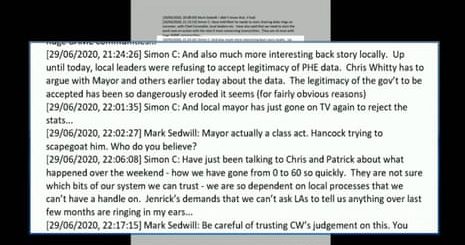Matt Hancock thought he should decide who lived and died if NHS became overwhelmed, Covid inquiry hears – UK politics live | Politics
Stevens says Hancock thought, if NHS overwhelmed, he should decide who would live or die, not doctors
O’Connor is now asking about discussions about what might need to happen if the NHS was overwhelmed, and care had to be rationed.
In his witness statement Stevens said Matt Hancock thought that, if decisions had to be taken about who would live and who would die, that should be a ministerial matter. He said:
The secretary of state for health and social care took the position that in this situation he – rather than, say, the medical profession or the public – should ultimately decide who should live and who should die. Fortunately this horrible dilemma never crystallised.
Stevens tells the hearing:
I certainly wanted to discourage the idea that an individual secretary of state, other than in the most exceptional circumstances, should be deciding how care would be provided.
I felt that we are well served by the medical profession, in consultation with patients to the greatest extent possible, in making those kinds of decisions.
Key events
Anas Sarwar said in private meeting Starmer’s original response to Israel-Hamas war lacked ‘humanity’, leak shows

Severin Carrell
Anas Sarwar furiously accused Keir Starmer of lacking “humanity” and “empathy” in his initial handling of questions about Israel’s attacks on Gaza, according to a leaked transcript of a meeting with pro-Labour Muslims.
The text, leaked to the Record newspaper, quotes the Scottish Labour leader saying Labour faced a long-term “repair job” to rebuild its reputation amongst Muslim voters because of Starmer’s hardline stance – since amended – on Israel’s right to attack Gaza.
Sarwar has already publicly made clear he was deeply unhappy with the UK Labour leader’s language, in a radio interview on 11 October, where he appeared to endorse Israel’s right to cut off water and power to Gaza.
He told the Record earlier this week Starmer had “hurt” Muslims by seemingly agreeing that Israel was in the right.
Starmer took a more nuanced stance on Gaza in a statement to the Commons on 16 October, the day Sarwar spoke to the Labour Muslim Network. But privately Sarwar was furious, the transcript shows. He said:
I can tell you first-hand how devastated people are right across the Muslim community. And that is not to negate or talk down the devastation felt in the Jewish community.
(That) humanity and empathy is, if we are being blunt about it, what has been missing from some of the statements which has caused so much of the hurt, where it feels as if there is an inconsistency, or a dehumanizing, or not seeing the value of one life to be equal to another life.
That empathy, which includes statements like ‘every life is equal’, ‘every Palestinian life is equal to every Israeli life’, ‘one life lost in Palestine, one life lost in Israel is one life too many’, and I think that level of humanity has been the bit that has been missing.
(I) made the point to senior colleagues – you can work out who they are – saying it shouldn’t take a Muslim voice in Scotland to be getting people to understand the impact on Asian communities across the country of what language is being said, but sadly that’s what it’s been, or that’s what it felt like.

Wormald rejects claim DHSC was chaotic and dysfunctional during Covid
Keith asked Wormald to respond to more general criticism of how the Department of Health and Social Care was equipped to deal with the Covid crisis.
He quoted from this extract from the witness statement by Mark Sedwill, cabinet secretary at the time, who said the NHS had “inadequate critical care capacity” for a public health crisis.
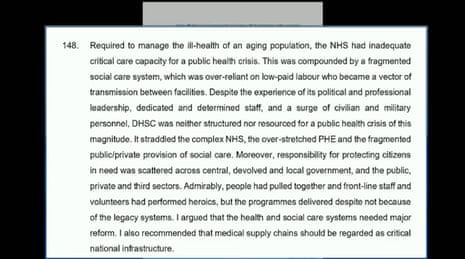
And Keith asked about this extract from the witness statement by Helen MacNamara, the deputy cabinet secretary at the time, who writes about concerns that DHSC appeared to be “overwhelmed”.
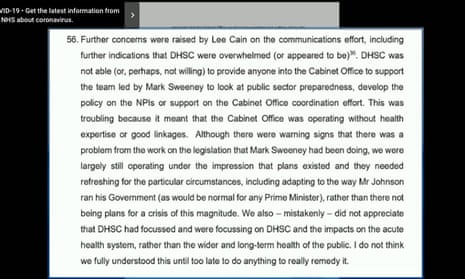
And Keith said Sir Patrick Vallance, the chief scientific adviser, wrote in his diaries about the “chaos, operational mess, inefficiency, lack of grip in the DHSC”. Vallance also described the department as “ungovernable and a web of competing parts”.
Asked if he thought DHSC was chaotic or dysfunctional, Wormald said he did not agree at all.
But he said he did agree that there was a structural problem with the relationship between health and social care.
He said the department was under a lot of pressure, dealing with something unprecedented. He went on:
People were at times very down that we weren’t able to get on top of some of the problems. So I’m not going to say this was some sort of perfect, easy situation. But I don’t recognise the sort of chaos and dysfunction. I recognise people working incredibly hard in very difficult circumstances to get on top of huge, huge challenges.
The inquiry has now stopped for lunch. It will resume at 1.45pm.
Wormald says people at top of government spent far too much time on ‘blame game’ at start of pandemic
Wormald says he did not realise at the time how many people in government felt Matt Hancock had not been honest. If he had known the extent of this, he would have been worried. He says he can now see that relations were more toxic than he realised at the time.
He also says too much time was spent on feuding and blame games.
One of my reflections so far, on the evidence that the inquiry has heard, is the amount of time and energy that appears to be taken up very early in the pandemic on the blame game – that energy would clearly have been better spent solving the problems that the pandemic was bringing.
Wormald does not accept Hancock lied during Covid, but he says he challenged him over repeated claims he ‘over-promised’
Keith says it has been claimed that Matt Hancock regularly said things during the pandemic that were not true. (See 10.01am.) Was Wormald aware of that?
Wormald says he was aware of a very small number of cases where Hancock was accused of saying things that were untrue.
He says he personally did not come across cases where Hancock said things that were actually untrue.
But he says there were also claims that Hancock was “over-optimistic about what would happen” and that he had “over-promised”. He says this was said “quite a lot”.
There were a lot of people who said that the secretary of state was over-optimistic about what would happen and over-promised on what could be delivered.
That was said really quite a lot. I think it was a very small number of people who said that he was actually telling untruths.
Wormald does not say at this point whether he thought this criticism was fair.
When pressed on this, Wormald says he thinks, when Hancock is asked about this, he will say that he genuinely believed he could do what he was promising. Hancock’s leadership style involved setting challenges to get the system to deliver, he says.
Wormald says he spoke to Hancock about this behaviour. He says Hancock deliberately set challenging targets.
He was always clear that he was doing it for a positive reason. So setting a very aspirational target, not necessarily expecting to hit it, but to galvanise the system to do more.
Q: What did you do when you were asking about Hancock saying things that were just not true?
Wormald says, when these issues were raised with him, he looked into it. He says he could not find evidence that Hancock had said things that were untrue.
For example, it was claimed that Hancock had said people were being tested on being discharged into care homes from hospitals. Wormald says he could not find evidence Hancock had made a false claim.
He says there were far more incidents that came into the category of “over-promising” rather than telling untruths.
Q: Did you ever say to Hancock lots of people think you are saying things that are untrue? Did you put it to him that this was damaging for trust in the department?
Wormald says he had conversations where he told Hancock people thought he was over-promising. Hancock always said a) he believed what he was saying was possible and b) he thought it was important to be optimistic and aspirational.
He says Hancock will be “surprised” at how many people were saying he said things that were not untrue. He knew Dominic Cummings thought he did not tell the truth, but he is likely to be surprised Helen MacNamara thought that. Wormald says he personally was surprised to hear MacNamara say that, because he had not heard that from her before.
Wormald starts by repeating what he said when he gave evidence to the inquiry during module one; he says he wants to express his regret to everyone who suffered, directly or indirectly, during Covid. And he expresses his thanks to NHS staff.
Asked to explain his role as permanent secretary at the Department of Health and Social Care, Wormald says it has three parts. He is chief executive at the department; chief adviser to the secretary of state, who holds the legal powers of the department; and accounting officer for the department, in charge of resources voted by parliament.
Keith asks about the chief medical officer’s role. Prof Sir Chris Whitty is the CMO.
Wormald says the CMO is an integral part of the department. He has permanent secretary rank. He is the chief clinical adviser to the secretary of state on matters relating to England. But he is also an adviser to the PM, and to cabinet, on clinical matters relating to the UK.
Chris Wormald, permanent secretary at the Department of Health, gives evidence to Covid inquiry
The next witness is Sir Chris Wormald, permanent secretary at the Department of Health and Social Care.
Hugo Keith KC, lead counsel for the inquiry, is doing the questioning.
He says Wormald has submitted four statements to the inquiry running to hundreds of pages.

Philip Dayle is now asking questions on behalf of the Federation of Ethnic Minority Healthcare Organisations (FEMHO).
Q: When did it become clear that black, Asian and ethnic minority communities were disproportionately being affected by Covid?
Stevens says by early spring. He recalls a meeting in April where the issue was raised.
Q: Was that fast enough?
Stevens says he acted immediately concerns were raised with him.
Stevens has now finished his evidence.
Anthony Metzer KC is now asking questions on behalf of groups representing people with long Covid.
Q: Was the NHS concerned about long Covid by July 2020?
Yes, says Stevens.
Q: Would public health messaging have helped?
Q: Was the NHS worried by August 2020 that long Covid would create significant long-term costs for the NHS?
Yes, says Stevens.
Q: How did decision-makers respond?
Stevens says the Department of Health and Social Care was concerned about this. Ministers were looking at this.
Bethan Harris, counsel for Covid Bereaved Families for Justice Cymru, is asking questions now about hospital discharges.
Stevens says Matt Hancock decided on 11 March that people being discharged from hospitals into care homes would not be prioritised for testing. He says Hancock took this decision on the basis of clinical advice.
At the time, he says, there was a recognition that people could have Covid without being symptomatic. But he says there was “uncertainty” around the extent to which that happened.
He says the courts have looked at this issue. He says the courts decided that it was reasonable for ministers to prioritise testing in the way that they did, but that better guidance should have been offered to care homes about isolating people being admitted from hospital.
O’Connor is asking about PPE. He says PPE will be covered properly in another module, but he raises something Helen MacNamara said in her witness statement about whether PPE was suitable for women.
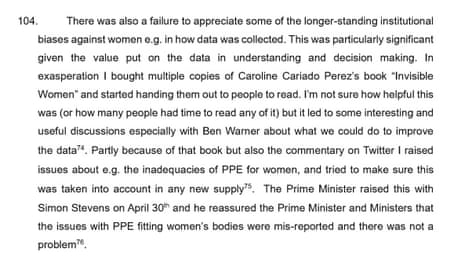
Stevens says MacNamara was right to raise this. He says the NHS was already looking at this issue at this point.
O’Connor asks if, as the inquiry heard yesterday, it is true that Stevens told Boris Johhson when Johnson asked about this that there was not a problem.
Stevens says that is not what he said at the meeting. He says minutes of that meeting are available, and he quotes from them. They record Stevens telling the PM that work on this was ongoing and that testing was under way to make sure PPE was suitable for women.

Stevens says Boris Johnson wrong to argue lockdown might not have been needed if NHS had addressed bedblocking problem
O’Connor shows Stevens an extract from Boris Johnson’s witness statement in which Johnson seems to imply that he was forced into a lockdown because the NHS had not dealt with its capacity problem, and bedblocking (patients taking up space because adult social care provision outside hospital was not available).
In it Johnson says:
It was very frustrating to think that we were being forced to extreme measures to lock down the country and protect the NHS – because the NHS and social services had failed to grip the decades old problem of delayed discharges, commonly known as bed blocking. Before the pandemic began I was doing regular tours of hospitals and finding that about 30 per cent of patients did not strictly need to be in acute sector beds.
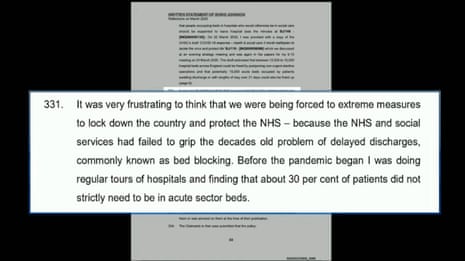
Stevens says Johnson was right to say there were longstanding problems with social care, that led to patients being stuck in hospital when they could be at home. But he goes on:
We and indeed he were being told that if action was not taken on reducing the spread of coronavirus, there wouldn’t be 30,000 hospital inpatients, there would be maybe 200,000 or 800,000 hospital inpatients.
So you can’t say that you would be able to deal with 200,000 or 800,000 inpatients by reference to 30,000 blocked beds.
Even if all of those 30,000 beds were freed up – for every one coronavirus patient who was then admitted to that bed, there would be another five patients who needed that care but weren’t able to get it. So no, I don’t think that is a fair statement in describing the decision calculus for the first wave.
Stevens says Hancock thought, if NHS overwhelmed, he should decide who would live or die, not doctors
O’Connor is now asking about discussions about what might need to happen if the NHS was overwhelmed, and care had to be rationed.
In his witness statement Stevens said Matt Hancock thought that, if decisions had to be taken about who would live and who would die, that should be a ministerial matter. He said:
The secretary of state for health and social care took the position that in this situation he – rather than, say, the medical profession or the public – should ultimately decide who should live and who should die. Fortunately this horrible dilemma never crystallised.
Stevens tells the hearing:
I certainly wanted to discourage the idea that an individual secretary of state, other than in the most exceptional circumstances, should be deciding how care would be provided.
I felt that we are well served by the medical profession, in consultation with patients to the greatest extent possible, in making those kinds of decisions.
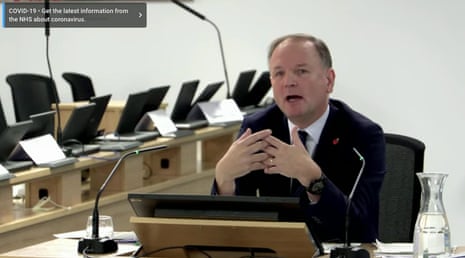
Stevens says ‘for the most part’ he found Matt Hancock truthful
O’Connor says the inquiry has heard claims that Matt Hancock was dishonest. (See 10.01am.)
Q: Did you find Hancock truthful?
Stevens replies:
All I would say is strong accusations need strong evidence to back them up. And I don’t think I’ve seen that evidence.
O’Connor says he does not think Stevens is “engaging” with the question. He tries again.
Q: Was Hancock someone who you found you personally could trust?
Stevens replies: “Yes. For the most part, yes.”
Asked what he meant by that, Stevens goes on:
I’m not denying that there were a small, handful of occasions during the course of the year, year and a half, when there were tensions. But that I don’t think is particularly surprising given the circumstances under which everybody was working.
UPDATE: Ben Quinn has posted on X the extract on this from Stevens’ statement.
From the #CovidInquiry ..
Matt Hancock told officials that he – rather than the medical profession – “should ultimately decide who should live or die,” if the NHS was overwhelmed, the Covid-19 Inquiry has been told by the former head of NHS England, Simon Stevens pic.twitter.com/Z2W8uwEghf
— Ben Quinn (@BenQuinn75) November 2, 2023


